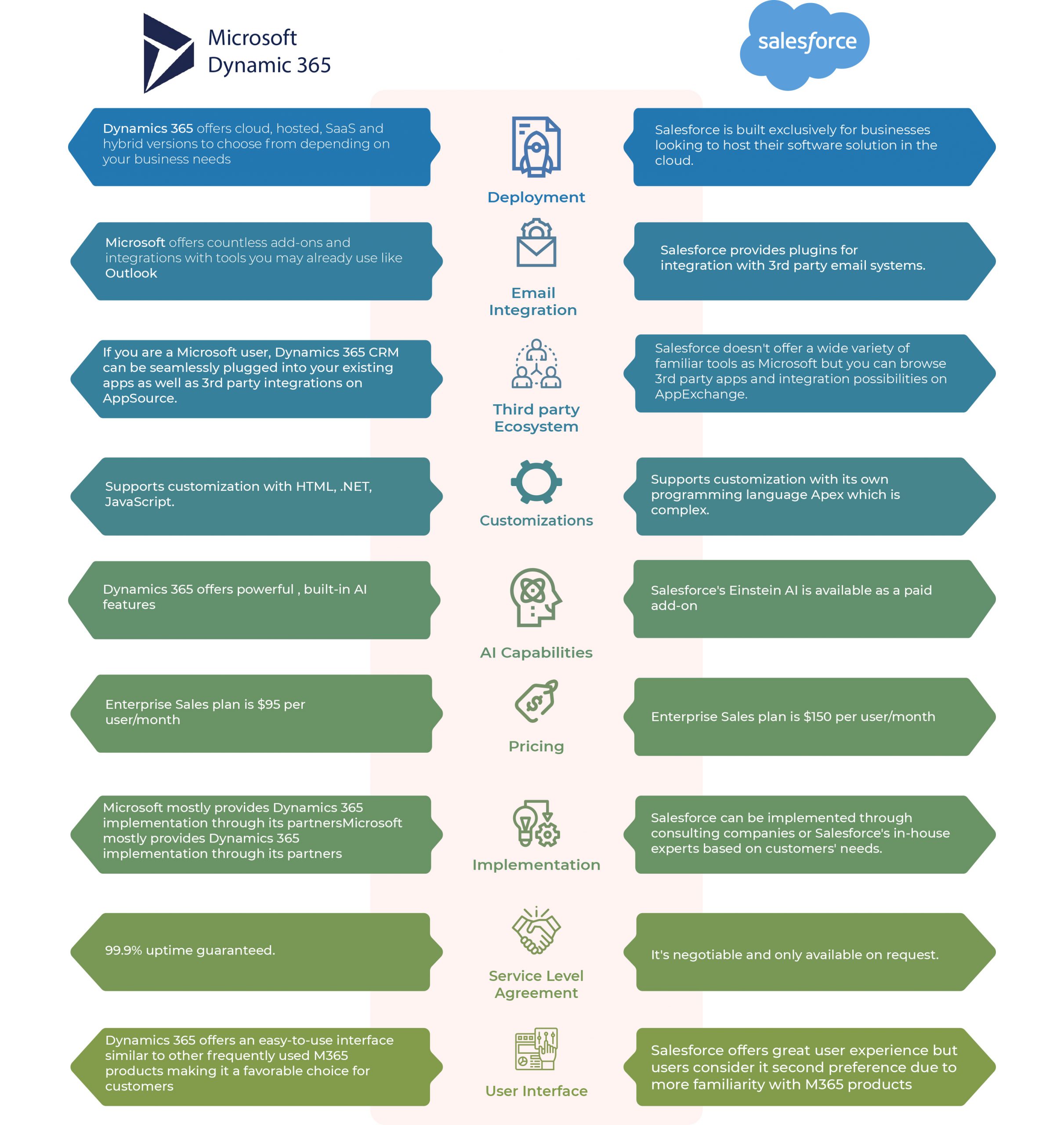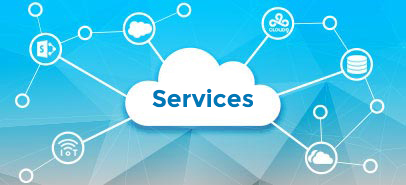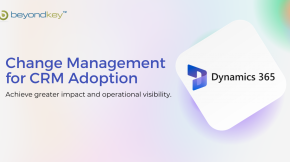Microsoft Dynamics 365 vs Salesforce: Which is the better pick?
The CRM market is growing rapidly. A CRM is a software that enables organizations to collect, organize, manage customers’ data in an efficient way. While enterprises have quite a few options out there in the CRM software space, Microsoft Dynamics and Salesforce have been the top two leading cloud-based CRMs allowing their users to access customer-related information and manage interaction with customers virtually from anywhere. The most common question that arises is Microsoft Dynamics or Salesforce which better? We have done a comparative analysis on Microsoft Dynamics vs Salesforce
Comparison between Microsoft Dynamics vs Salesforce
In order to determine, which one is better, we would consider the following aspects:

Let’s deep dive in each of these aspects.
1. Deployment
Microsoft Dynamics 365 provides its customers – cloud, hosted, SaaS and hybrid versions with Subscription and Perpetual licenses options. For companies seeking flexibility in deployment and robust data management capabilities, CRM solutions like Dynamics 365 will be a good choice.
While Salesforce is designed and built exclusively for the cloud, Deployment for Salesforce is deceptively complex as there are a number of tools that you need to choose from for Salesforce deployment depending on your use case.
2. Email Integration
While Microsoft offers a variety of add-ins and third-party plugins for email integration, it works best with existing Microsoft products like Office 365, LinkedIn, and Yammer. You can also integrate Sales Order to Payment gateways by incorporating Business Central, QuickBooks, or any other ERP of your choice. Salesforce offers a wide range of plugins for integration with multiple email systems
3.Third-Party Ecosystem
Microsoft offers a business suite of applications like Microsoft 365 that can be integrated into Dynamics 365 CRM. So, if you are a Microsoft user, Dynamics 365 CRM can be seamlessly plugged into your existing apps as well as 3rd party add-ins on AppSource.
Salesforce also offers a wide range of third-party applications to choose from. However, Salesforce doesn’t offer familiar tools like Microsoft but you can browse 3rd party apps and integration possibilities on AppExchange.
4. Customization
Dynamics 365 allows for easy customization using universal web standards such as HTML, .NET, Java.
Microsoft Dynamics 365 is ready to integrate with a variety of other solutions that your business may use. A variety of Dynamics 365 add-ins and other business apps are easily available on Microsoft AppSource.
Salesforce lives in a multi-client cloud environment. It is difficult to customize as it supports customization with its proprietary programming language called Apex.
For companies that prefer a best-in-class approach and value third-party integration and customization – Salesforce is highly flexible in that regard.
You might like to check out one of our extremely useful Dynamics 365 Kickstarter add-in for Volunteer, Donation, and Fundraising Management. You can download it from here.
5. AI Capabilities
Dynamics 365 comes power-packed with built-in AI features within the CRM at no extra cost. Microsoft has also developed AI add-ons for the Dynamics 365 suite that turn your data into insights and actions, helping give you a unified view of your customers’ data.
Salesforce’s Einstein is considered better than Microsoft’s AI. Salesforce users can use Einstein to gain insights from CRM data, natural language processing, and machine learning. However, it is available as a paid add-on.
6. Pricing
Microsoft offers Dynamics 365 at a discounted price for mission-driven organizations. Salesforce also offers the first 10 subscriptions for free as part of their Power of Us Program.
If you are a non-profit that is still using the Excel workbooks, you must go with MS Dynamics 365 CRM as it will get to kick-started easily. NPOs having a tech-savvy workforce and volunteers can go with Salesforce.
7. Implementation
Microsoft doesn’t usually handle CRM implementations in-house but provides implementation through its partners. Salesforce offers implementations through their in-house experts or may outsource implementation to a partner depending on the customers’ needs.
Before diving in it’s important to review and evaluate your current systems, plan accordingly, and engage the right team.
A successful Salesforce or Dynamics 365 implementation needs proven expertise, training, and support services to ensure quality and best practices.
8. Service Level Agreement
As Dynamics 365 is a Microsoft product you can be rest assured as 99.9% uptime is guaranteed for all of its products. However, Salesforce doesn’t guarantee uptime for your service. It is only available on request and might need negotiation.
9. User Interface
Dynamics 365’s easy-to-use interface and its similarity with other Microsoft products offers a big advantage to D365 customers.
Even though Salesforce offers a great user experience and flexibility, Microsoft products are still preferred by most businesses, making Salesforce second best in terms of UI.
Final Thoughts
Dynamics 365 CRM is an incredible solution for companies looking to leverage the Microsoft platform. Dynamics 365 Sales provides all CRM functions while bringing along other Microsoft tools to provide an all-inclusive, fully integrated solution. Salesforce allows its users to take advantage of a wide range of modules and applications while offering extensive third-party integrations.
With Salesforce, you can leverage best-in-class shared cloud infrastructure and services. On the other hand, it also offers integrations with Office365, however, it might require some technical know-how. You will require a layer-2 cloud connector and register for the Salesforce developer edition. It boils down to the individual choice, if you are an avid Outlook, MS Teams user then D365 is the go-to solution for your process automation goals.
Our Verdict On Microsoft Dynamics 365 Vs Salesforce
Based on our analysis, Dynamics 365 is indeed a better choice for those who work in the Office 365 environment because of its robust third-party integration offering, broader functionalities/capabilities, lower cost, and simpler interface. The users can leverage the integrations with Outlook, MS Teams, Power BI, and Voice of Customer. You can also connect your LinkedIn Sales Navigator with Dynamics CRM and monitor the campaigns in a hassle-free manner.
We hope you have enjoyed exploring the comparison of features in Microsoft Dynamics vs Salesforce CRM.
Get in touch with our Microsoft Dynamics 365 consultants to discover how these advanced features and tools can improve your efficiency, productivity, and scalability and enhance customers service.

Microsoft Dynamics Vs Salesforce
Maximize Efficiency with Microsoft Dynamics 365
Contact us














